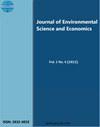Enhancing Municipal Solid Waste Management in Rapidly Urbanizing Areas: A Case Study of Rudrapur City, India
引用次数: 0
Abstract
Urban solid waste management is a crucial challenge, involving treatment, recycling, and energy conversion for environmental and public health protection. This research explores the management of municipal solid waste in the city of Rudrapur, located in the Himalayan foothills, in the midst of rapid urbanization and industrial development. Rudrapur is confronted with an increasing waste production as a consequence of its expanding population. The study examines waste distribution, evaluates current practices, and proposes effective waste management solutions for local governance. Using secondary data, interviews, and fieldwork, the study assesses waste generation, collection, transportation, processing, and disposal. The waste, comprising biodegradables, recyclables, and non-recyclables, presents challenges like inadequate equipment, unregulated dumping, and inefficiencies. Composite scores reveal disparities in waste management among city wards, uncovering infrastructure and practice gaps. Recommendations include source segregation, expanded composting, improved waste processing, and public awareness. Modern techniques like Geographic Information Systems (GIS) and remote sensing can enhance waste management strategies. The study underscores the urgency of addressing improper waste disposal's environmental and health impacts. By tackling deficiencies and embracing innovation, Rudrapur can transition to a sustainable solid waste management system, fostering a cleaner and healthier urban environment.快速城市化地区加强城市固体废物管理:以印度鲁德拉普尔市为例
城市固体废物管理是一项至关重要的挑战,涉及处理、回收和能源转换,以保护环境和公众健康。本研究探讨了位于喜马拉雅山麓的鲁德拉普尔市在快速城市化和工业发展过程中的城市固体废物管理。由于人口不断增长,鲁德拉普面临着日益增加的废物生产。该研究考察了废物分布,评估了当前的做法,并为地方治理提出了有效的废物管理解决方案。利用二手数据、访谈和实地调查,本研究评估了废物的产生、收集、运输、处理和处置。这些垃圾包括可生物降解物、可回收物和不可回收物,它们面临着设备不足、倾倒不受监管和效率低下等挑战。综合得分揭示了各城市在废物管理方面的差异,揭示了基础设施和实践方面的差距。建议包括污染源隔离、扩大堆肥、改进废物处理和提高公众意识。地理信息系统(GIS)和遥感等现代技术可以加强废物管理战略。这项研究强调了解决不当废物处置对环境和健康影响的紧迫性。通过解决不足和拥抱创新,鲁德拉普可以过渡到可持续的固体废物管理系统,营造一个更清洁、更健康的城市环境。
本文章由计算机程序翻译,如有差异,请以英文原文为准。
求助全文
约1分钟内获得全文
求助全文
来源期刊

Journal of Environmental Science and Economics
Environmental Economics-
自引率
0.00%
发文量
0
期刊介绍:
Journal of environmental science and economics (JESCAE), ISSN: 2832-6032 is an open access peer-reviewed journal that considers articles and reviews articles on all aspects of environmental economics.
Aim and Scope
Journal of Environmental Science and Economics is an international scholarly refereed research journal that aims to promote the theory and practice of environmental economics, Sustainability research, technological innovation, and economics. A broad outline of the journal''s scope includes; peer-reviewed original research articles, case, and technical reports, reviews and analyses papers, short communications and notes to the editor, in interdisciplinary information on the practice and status of research in environmental science, sustainability, technological innovations, and economics.
The main aspects of research areas include, but are not limited to; Environmental pollution control and abatement technology, Sustainable and economic Development, sustainable consumption and Sustainability, Environmental and sustainability assessment, transport and fate of pollutants in the environment, concentrations and dispersion of wastes in air, water, and non-point sources pollution, atmospheric pollutants and trace gases, environmental impact assessment, industrial ecology, ecological and human risk assessment; improved energy management and auditing efficiency and environmental standards and criteria.
 求助内容:
求助内容: 应助结果提醒方式:
应助结果提醒方式:


